Refresher/Summary:
- Leucine is an essential amino acid, meaning that we can only get it from food.
- It’s also one of the 3 branched chain amino acids (BCAAs), important for building muscle proteins. The other 2 are isoleucine and the valine.
- You should aim for at least 42 mg of leucine per kg of bodyweight (19 mg per lb).
- The best vegan sources of leucine are mainly legumes, plus vital wheat gluten (seitan).
Like all amino acids, it’s tougher to get enough of leucine on a vegan diet than one that includes animal products (e.g. chicken, beef, fish).
But it can be done, especially if you know which vegan foods contain the most of it.
That’s why I put together a collection of the 30 best vegan leucine-rich whole foods.
Table of Contents
How Much Leucine Do You Need Per Day
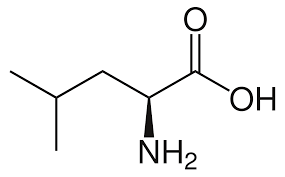
The minimum target for leucine is 42 mg per kg of bodyweight.
For example, I’m 170 lbs (77kg), so that’s 3234 mg, or 3.234 g per day, which isn’t that difficult to get.
If you’re an athlete, you’re probably going to want to aim for even more. Leucine is often mentioned on fitness forums because it helps prevent muscle loss.
A leucine deficiency could lead to the following issues:
- Poor muscle growth
- Difficulty controlling blood sugar levels (which can affect mood, energy levels, and more)
It’s not the most serious deficiency compared to some other nutrients, but it will have an effect.
If you’re not sure if you’re getting enough, track what you eat for a few days using a detailed food tracker like Cronometer.
The Best Overall Vegan Sources of Leucine
I’ve created full lists of leucine sources per serving and per 100 calories later down on the page.
For now, I’d like to start by looking at the best of the best sources of leucine.
The absolute best sources should have a lot of leucine per 100 grams, and also per calorie. A bubble chart lets us understand this pretty easily.
The top sources should tend towards the top-right corner. Click the chart below to expand it.
Two foods clearly stand out:
- Vital wheat gluten (used to make seitan)
- Dried seaweed
Dried seaweed isn’t too useful because it’s really hard to eat 100 grams of it.
Unfortunately, those 2 foods perform so well on the chart that it’s hard to see the rest of the foods. Here’s a new chart with vital wheat gluten and dried seaweed removed.
That’s a lot clearer. In terms of leucine efficiency, it’s clear that certain foods stand out:
- Soybeans
- Legumes in general (adzuki beans, lentils, mung beans, kidney beans, black beans)
- Leafy greens like watercress and spinach
The Best Vegan Foods for Leucine Per 100 Grams
Another useful way to look at leucine sources is per 100 grams.
Here’s a list of the top 30 plant-based foods by weight:
| Food | Leucine per 100 g |
|---|---|
| Vital wheat gluten | 5.40 |
| Seaweed (dried) | 4.94 |
| Hemp seeds | 2.16 |
| Peanuts | 1.67 |
| Pistachio nuts | 1.60 |
| Pumpkin seeds | 1.57 |
| Almonds | 1.47 |
| Chia seeds | 1.37 |
| Sesame seeds | 1.36 |
| Cashew | 1.28 |
| Oats | 1.28 |
| Flaxseed | 1.23 |
| Brazil nut | 1.19 |
| Walnut | 1.17 |
| Hazelnut | 1.06 |
| Pine nuts | 0.99 |
| Soybeans | 0.88 |
| Buckwheat groats | 0.74 |
| Black beans | 0.71 |
| Navy beans | 0.70 |
| Kidney beans | 0.69 |
| Lentils | 0.65 |
| Adzuki beans | 0.63 |
| Chickpeas | 0.63 |
| Macadamia nut | 0.60 |
| Pecans | 0.60 |
| Fava bean | 0.57 |
| Rye grain | 0.56 |
| Mung bean | 0.54 |
| Lima beans | 0.53 |
Vital wheat gluten and dried seaweed (kind of cheating because it’s dried) top the list.
Seeds and nuts round out most of the top 10 sources, suggesting that they’re a dense source of leucine if you’re not too concerned about calories.
Finally, beans still rank pretty well on this list.
The Top Vegan Leucine Food Sources Per Serving and Calorie
I came up with this list by using the food database that the USDA provides, and extracting the nutritional information for over 120 vegan whole foods.
The table below is the result when I sort by amount of leucine per typical serving. I’ve also included the amount per calorie if you’re watching your overall calorie intake.
| Food | Serving | Energy (kcal) | Leucine (g) per serving | Leucine (g) per 100 calories |
|---|---|---|---|---|
| Vital wheat gluten | 100 g | 370 | 5.40 | 1.46 |
| Oats | 1 cup | 607 | 2.00 | 0.33 |
| Soybeans | 1 cup | 254 | 1.59 | 0.63 |
| Adzuki beans | 1 cup | 294 | 1.45 | 0.49 |
| Lentils | 1 cup | 230 | 1.30 | 0.56 |
| Navy beans | 1 cup | 255 | 1.27 | 0.50 |
| Kidney beans | 1 cup | 225 | 1.23 | 0.55 |
| Peanuts | 0.5 cup | 414 | 1.22 | 0.29 |
| Black beans | 1 cup | 227 | 1.22 | 0.54 |
| Buckwheat groats | 1 cup | 567 | 1.21 | 0.21 |
| Mung bean | 1 cup | 212 | 1.10 | 0.52 |
| Chickpeas | 1 cup | 269 | 1.04 | 0.38 |
| Pumpkin seeds | 1 cup | 285 | 1.01 | 0.35 |
| Pistachio nuts | 0.5 cup | 344 | 0.99 | 0.29 |
| Sesame seeds | 0.5 cup | 413 | 0.98 | 0.24 |
| Fava bean | 1 cup | 187 | 0.97 | 0.52 |
| Rye grain | 1 cup | 571 | 0.95 | 0.17 |
| Lima beans | 1 cup | 209 | 0.91 | 0.43 |
| Cashew | 0.5 cup | 393 | 0.88 | 0.22 |
| Almonds | 1/2 cup | 313 | 0.80 | 0.25 |
| Brazil nut | 0.5 cup | 438 | 0.79 | 0.18 |
| Spinach | 1 bunch | 78 | 0.76 | 0.97 |
| Hazelnut | 0.5 cup | 424 | 0.72 | 0.17 |
| Walnut | 0.5 cup | 383 | 0.68 | 0.18 |
| Pine nuts | 0.5 cup | 454 | 0.67 | 0.15 |
| Hemp seeds | 3 tbsp | 166 | 0.65 | 0.39 |
| Swiss chard | 10 leafs | 91 | 0.62 | 0.69 |
| Corn | 1 ear | 123 | 0.50 | 0.40 |
| Quinoa | 1 cup | 222 | 0.48 | 0.22 |
| Peas | 1 cup | 117 | 0.47 | 0.40 |
If one thing is clear, it’s that legumes are a great way to get leucine on a vegan diet.
Other than oats and vital wheat gluten, every other food in the top 10 is a legume. Several types of beans, along with lentils and peanuts.
Most people, depending on their size, should aim to have at least one serving of any of them per day.
Another Way to Get Leucine: Vegan Leucine Supplements
Some people hate eating beans of any kind.
If that’s you, there are 2 options if you’re okay with getting leucine through supplements.
First, you can buy an l-leucine powder, but it’s hard to find a vegan version of these. There are some, but many are derived from duck feathers.
The best one I’ve found that is definitely vegan is NutraBio’s 100 percent Pure L Leucine Vegetable Capsules.
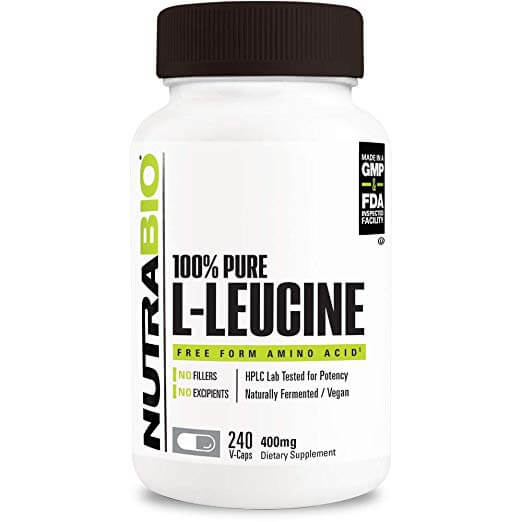
Another option is to find a good vegan protein powder that contains a high amount of leucine, some even have extra leucine added. That means a powder that is primarily made from soy, hemp, or peas, which are all relatively high in leucine as we saw above.
I’ve tried many vegan protein powders, but there’s one that I rank highly that also has added BCAAs – PlantFusion.
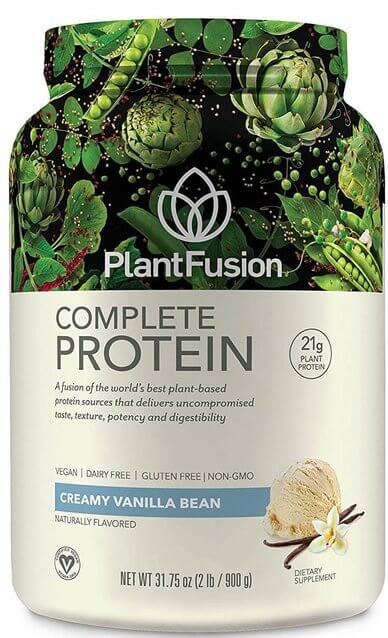
Why is PlantFusion the best here? Many reasons:
- It’s mainly made from pea protein. (Peas are among the best vegan BCAA sources.)
- It has 4,500 mg of added BCAAs per serving (including leucine of course).
- It tastes amazing (seriously, it’s one of the best tasting of 20+ that I’ve tried).
- It’s not too pricey either.
Vegan Recipes High in Leucine
The foods you should mainly focus on are:
- Soybeans (or tofu and tempeh)
- Oats
- Spinach
- Legumes in general (adzuki beans, lentils, mung beans, kidney beans, black beans)
- Peanuts
To help you get started with these if you’re not used to cooking and eating them, I’ve compiled 5 recipes that are high in leucine that contain these ingredients.
If you need more ideas, see my page of over 150 high protein vegan recipes.
1. Curried Tofu Scramble
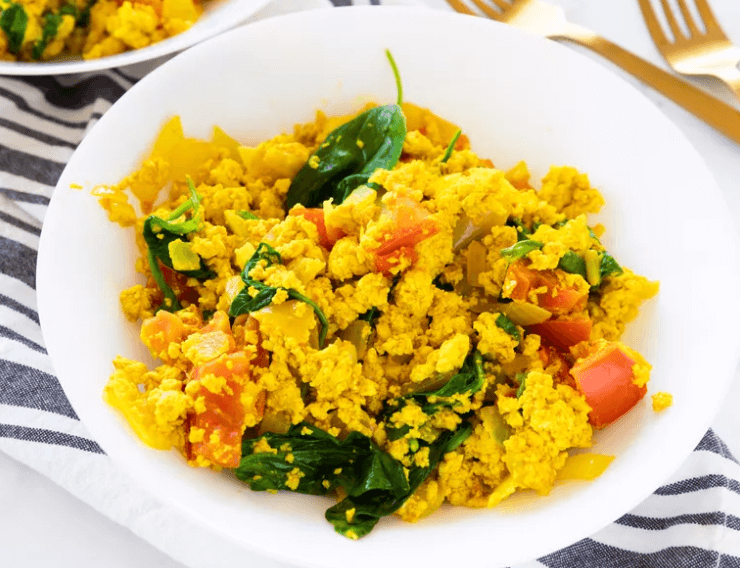
Tofu scramble is a great way to get protein in the morning while also filling any cravings for eggs.
This curried tofu recipe has both tofu and spinach, which gives it quite a bit of leucine and lysine. It’s one of the few tofu scrambles that I make on a regular basis.
2. Veggie and Tofu Stir Fry with Peanut Sauce
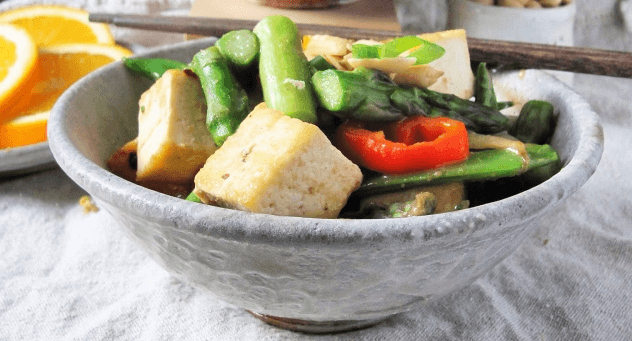
This is a relatively simple stir fry that’s packed with leucine. Like any stir fry, you can switch up the vegetables based on what you have available.
The most important ingredients are the tofu and peanut powder (you could substitute in peanut butter instead), which both have quite a bit of protein and leucine.
3. Apple Cranberry Oatmeal
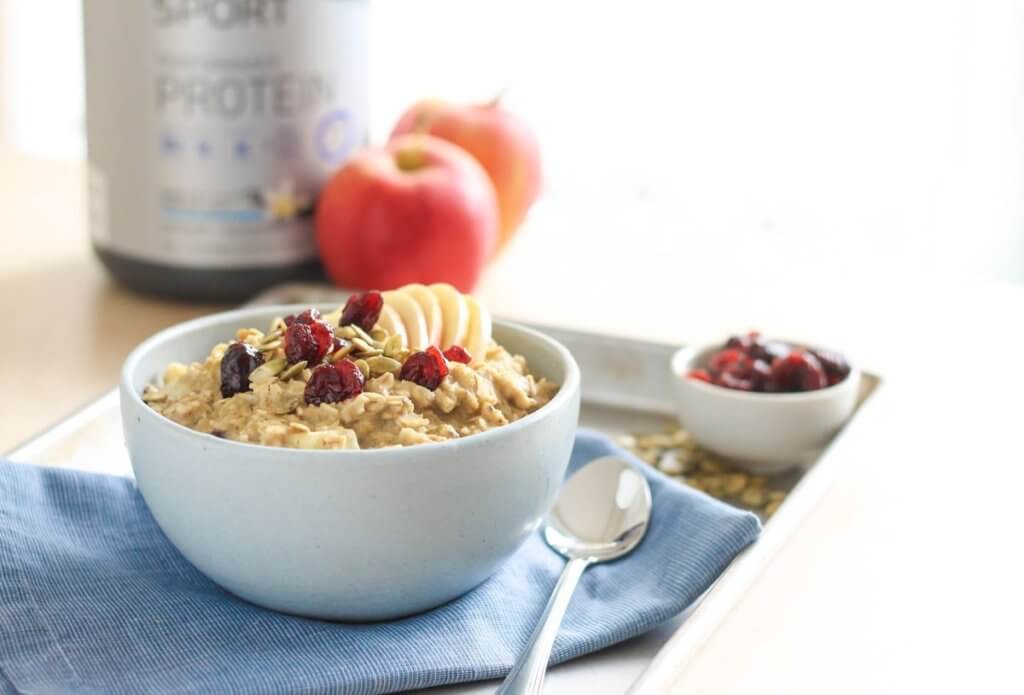
If you’re the type who finds oatmeal plain and boring, I’d suggest this recipe to spice things up.
Oats are a good source of leucine and lysine, so if you can find a way to enjoy them, it makes getting more of it into your diet a lot easier.
4. Garlic Spinach Lentils
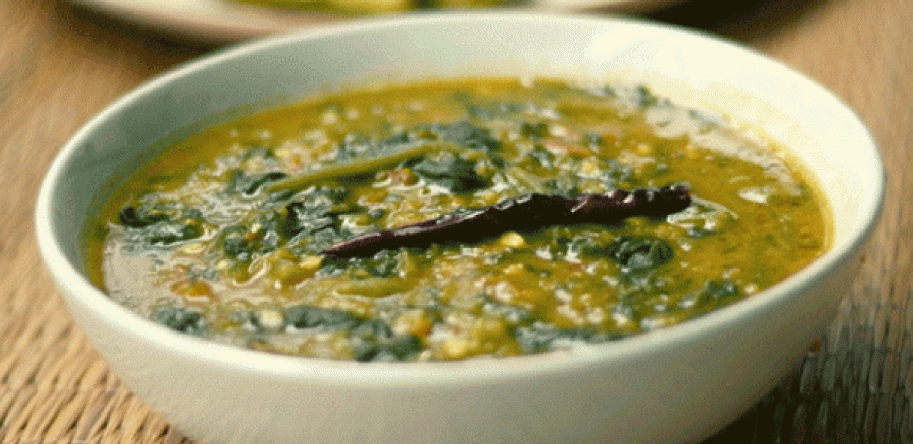
I realize it doesn’t look great from the picture, but I’ve made this myself and it tastes quite good.
More importantly, because of the lentils and spinach in it, it’s got a lot of leucine.
5. Crispy Peanut Tofu Cauliflower Rice Stir Fry
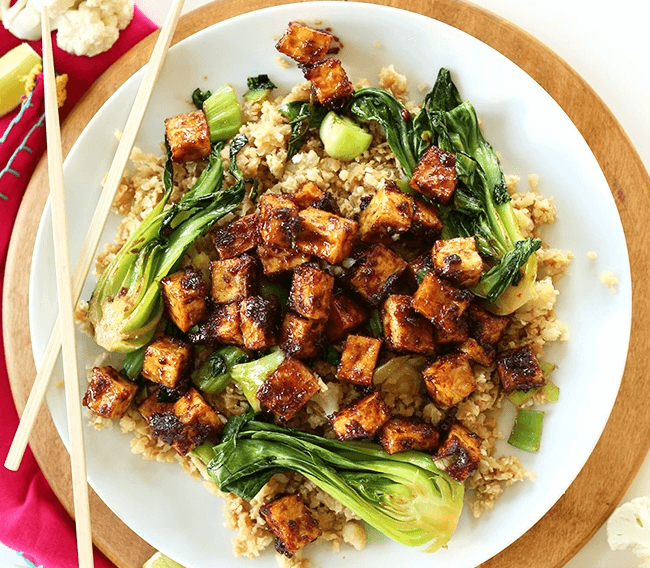
Since tofu and peanuts are both excellent sources of leucine, here’s another way you can combine them.
It’s high protein while being relatively low in carbohydrates since it swaps out rice for cauliflower.
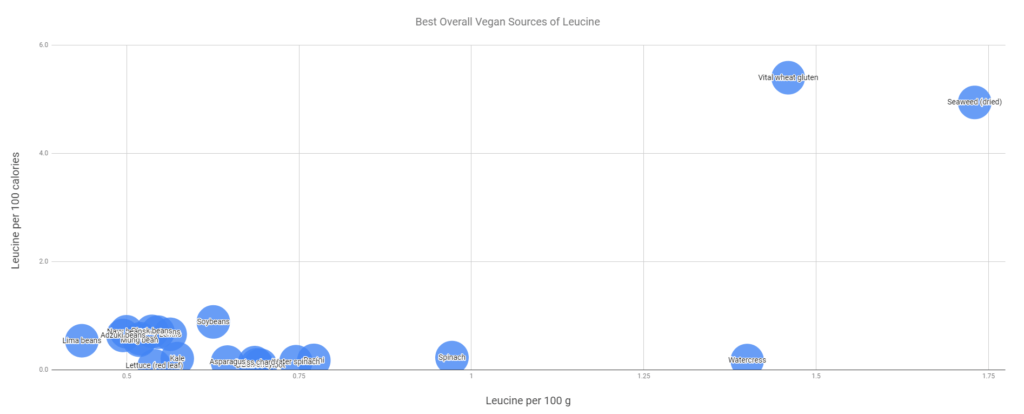
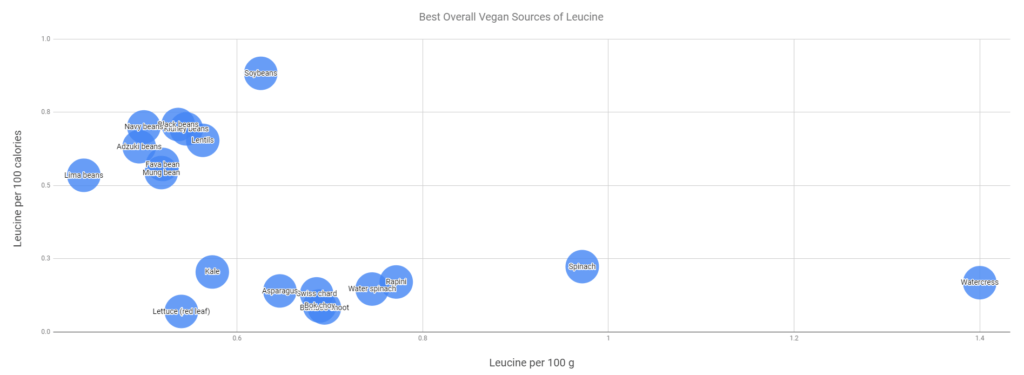

Are you kidding? Peas was so low on the list? Are you reading your own article?
Don’t appreciate the snark Faith, but to answer your question…(I assume you’re referencing the protein powder recommendation, you weren’t very clear).
Peas were low on the list of the best vegan foods for Leucine. They certainly aren’t a bad source of it, and you’re likely going to get leucine from a few sources on this list. Pea protein is a widely available source of protein, and contains a solid serving of peas.
In addition, the main reason I like PlantFusion is that there are 4,500 mg of added BCAAs, as I stated above. If these are evenly distributed across the different BCAAs, most people will get about 1/2 their RDA just from the added BCAAs in a scoop of protein powder. Put that together with the pea protein, and it should be really clear why it’s a good vegan choice for a leucine supplement.
You absolute LEGEND. Spent hours trying to find where I can get high levels of leucine on a vegan diet. Honestly, finding your article has just made my night! Thank you SO much for the time and effort you put into it and sharing it online for others’ gain!
You’re welcome 🙂
I’ve tried a variety of diets in my weight loss journey (200 lbs and counting), and here in a few months I’m going to try do do a bulk. Since the point of a bulk diet is to put on as much muscle as possible, obviously leucine intake is critical. I kinda wanted to play around with a vegan bulk, and this list is definitely helpful. Bookmarking it for later!
Could you comment on the relation on L-Leucine and BCAA for muscle growth. What would be the recommended dosage per day
Hi Yvon, it’s not something I’ve looked into in enough detail to give a confident answer on.
I’d refer you to Examine.com’s page on BCAAs, it’s really well put together.